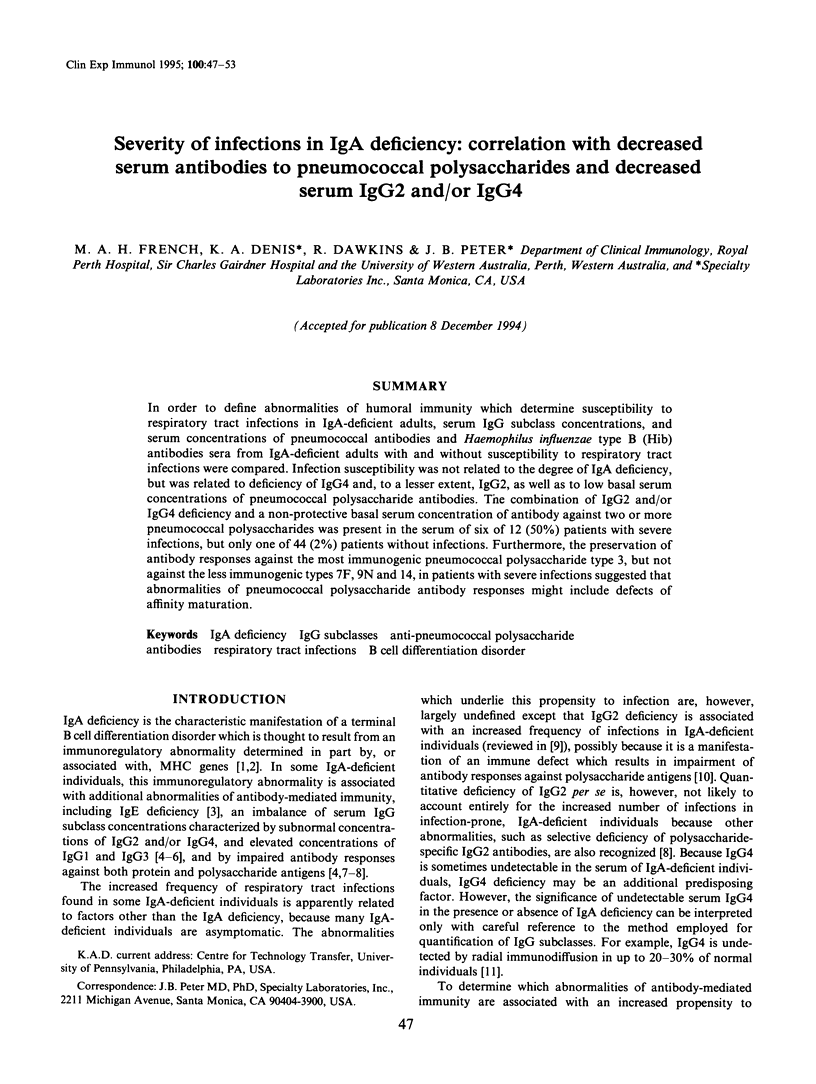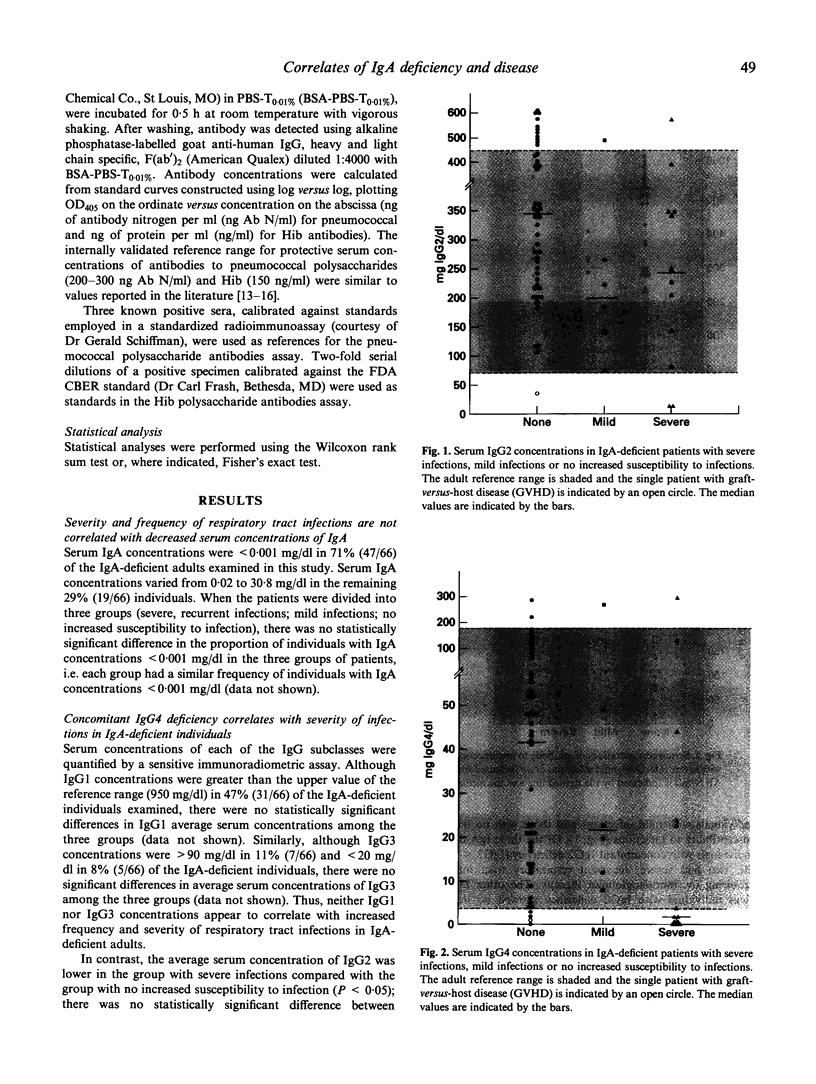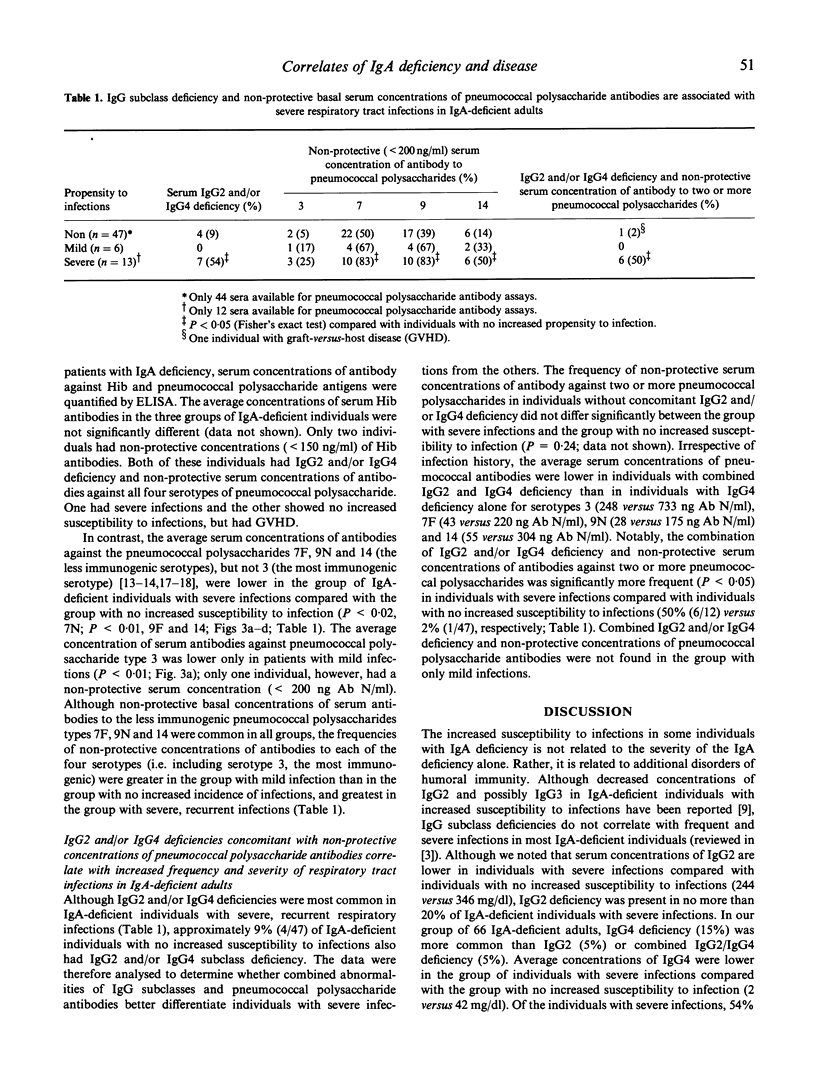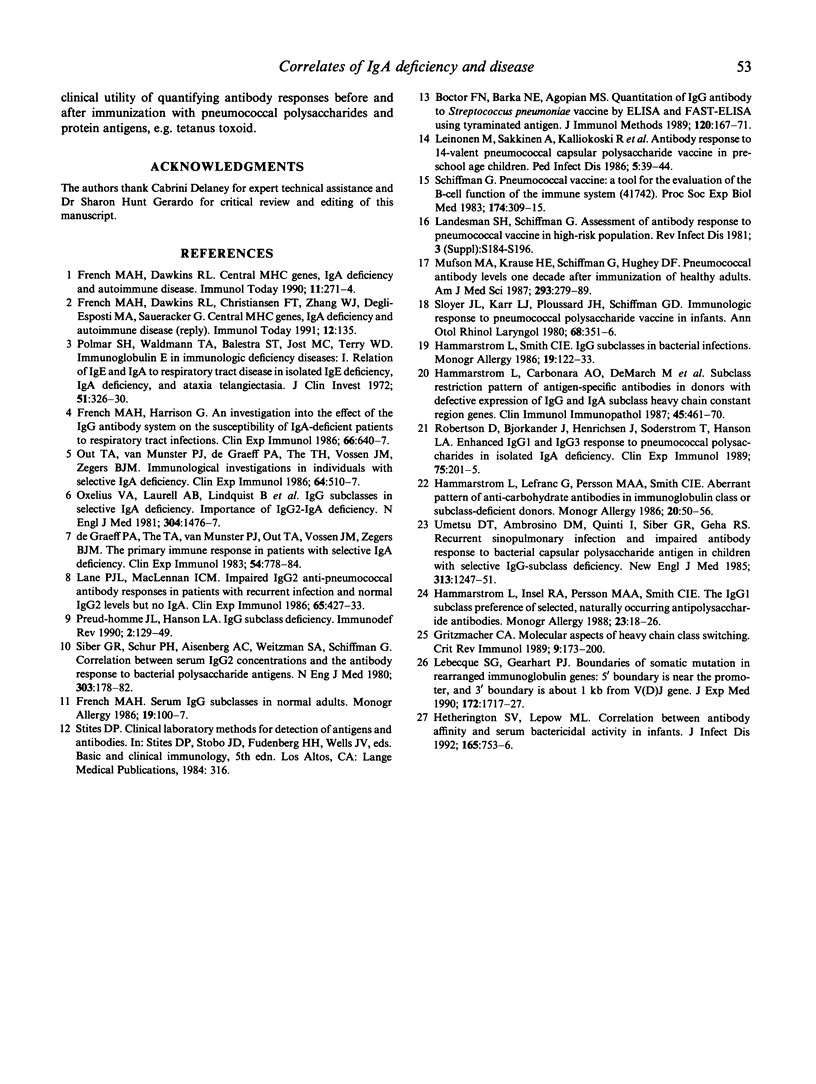Abstract
In order to define abnormalities of humoral immunity which determine susceptibility to respiratory tract infections in IgA-deficient adults, serum IgG subclass concentrations, and serum concentrations of pneumococcal antibodies and Haemophilus influenzae type B (Hib) antibodies sera from IgA-deficient adults with and without susceptibility to respiratory tract infections were compared. Infection susceptibility was not related to the degree of IgA deficiency, but was related to deficiency of IgG4 and, to a lesser extent, IgG2, as well as to low basal serum concentrations of pneumococcal polysaccharide antibodies. The combination of IgG2 and/or IgG4 deficiency and a non-protective basal serum concentration of antibody against two or more pneumococcal polysaccharides was present in the serum of six of 12 (50%) patients with severe infections, but only one of 44 (2%) patients without infections. Furthermore, the preservation of antibody responses against the most immunogenic pneumococcal polysaccharide type 3, but not against the less immunogenic types 7F, 9N and 14, in patients with severe infections suggested that abnormalities of pneumococcal polysaccharide antibody responses might include defects of affinity maturation.
Full text
PDF






Images in this article
Selected References
These references are in PubMed. This may not be the complete list of references from this article.
- Boctor F. N., Barka N. E., Agopian M. S. Quantitation of IgG antibody to Streptococcus pneumoniae vaccine by ELISA and FAST-ELISA using tyraminated antigen. J Immunol Methods. 1989 Jun 21;120(2):167–171. doi: 10.1016/0022-1759(89)90238-x. [DOI] [PubMed] [Google Scholar]
- De Graeff P. A., The T. H., van Munster P. J., Out T. A., Vossen J. M., Zegers B. J. The primary immune response in patients with selective IgA deficiency. Clin Exp Immunol. 1983 Dec;54(3):778–784. [PMC free article] [PubMed] [Google Scholar]
- French M. A., Dawkins R. L. Central MHC genes, IgA deficiency and autoimmune disease. Immunol Today. 1990 Aug;11(8):271–274. doi: 10.1016/0167-5699(90)90110-u. [DOI] [PubMed] [Google Scholar]
- French M. A., Harrison G. An investigation into the effect of the IgG antibody system on the susceptibility of IgA-deficient patients to respiratory tract infections. Clin Exp Immunol. 1986 Dec;66(3):640–647. [PMC free article] [PubMed] [Google Scholar]
- French M. Serum IgG subclasses in normal adults. Monogr Allergy. 1986;19:100–107. [PubMed] [Google Scholar]
- Gritzmacher C. A. Molecular aspects of heavy-chain class switching. Crit Rev Immunol. 1989;9(3):173–200. [PubMed] [Google Scholar]
- Hammarström L., Carbonara A. O., DeMarchi M., Lefranc G., Möller G., Smith C. I., Zegers B. J. Subclass restriction pattern of antigen-specific antibodies in donors with defective expression of IgG or IgA subclass heavy chain constant region genes. Clin Immunol Immunopathol. 1987 Dec;45(3):461–470. doi: 10.1016/0090-1229(87)90097-3. [DOI] [PubMed] [Google Scholar]
- Hammarström L., Insel R. A., Persson M. A., Smith C. I. The IgG1 subclass preference of selected, naturally occurring antipolysaccharide antibodies. Monogr Allergy. 1988;23:18–26. [PubMed] [Google Scholar]
- Hammarström L., Lefranc G., Lefranc M. P., Persson M. A., Smith C. I. Aberrant pattern of anti-carbohydrate antibodies in immunoglobulin class or subclass-deficient donors. Monogr Allergy. 1986;20:50–56. [PubMed] [Google Scholar]
- Hammarström L., Smith C. I. IgG subclasses in bacterial infections. Monogr Allergy. 1986;19:122–133. [PubMed] [Google Scholar]
- Hetherington S. V., Lepow M. L. Correlation between antibody affinity and serum bactericidal activity in infants. J Infect Dis. 1992 Apr;165(4):753–756. doi: 10.1093/infdis/165.4.753. [DOI] [PubMed] [Google Scholar]
- Landesman S. H., Schiffman G. Assessment of the antibody response to pneumococcal vaccine in high-risk populations. Rev Infect Dis. 1981 Mar-Apr;3 (Suppl):S184–S197. doi: 10.1093/clinids/3.supplement_1.s184. [DOI] [PubMed] [Google Scholar]
- Lane P. J., MacLennan I. C. Impaired IgG2 anti-pneumococcal antibody responses in patients with recurrent infection and normal IgG2 levels but no IgA. Clin Exp Immunol. 1986 Aug;65(2):427–433. [PMC free article] [PubMed] [Google Scholar]
- Lebecque S. G., Gearhart P. J. Boundaries of somatic mutation in rearranged immunoglobulin genes: 5' boundary is near the promoter, and 3' boundary is approximately 1 kb from V(D)J gene. J Exp Med. 1990 Dec 1;172(6):1717–1727. doi: 10.1084/jem.172.6.1717. [DOI] [PMC free article] [PubMed] [Google Scholar]
- Leinonen M., Säkkinen A., Kalliokoski R., Luotonen J., Timonen M., Mäkelä P. H. Antibody response to 14-valent pneumococcal capsular polysaccharide vaccine in pre-school age children. Pediatr Infect Dis. 1986 Jan-Feb;5(1):39–44. doi: 10.1097/00006454-198601000-00008. [DOI] [PubMed] [Google Scholar]
- Mufson M. A., Krause H. E., Schiffman G., Hughey D. F. Pneumococcal antibody levels one decade after immunization of healthy adults. Am J Med Sci. 1987 May;293(5):279–284. doi: 10.1097/00000441-198705000-00001. [DOI] [PubMed] [Google Scholar]
- Out T. A., van Munster P. J., De Graeff P. A., Thé T. H., Vossen J. M., Zegers B. J. Immunological investigations in individuals with selective IgA deficiency. Clin Exp Immunol. 1986 Jun;64(3):510–517. [PMC free article] [PubMed] [Google Scholar]
- Oxelius V. A., Laurell A. B., Lindquist B., Golebiowska H., Axelsson U., Björkander J., Hanson L. A. IgG subclasses in selective IgA deficiency: importance of IgG2-IgA deficiency. N Engl J Med. 1981 Jun 11;304(24):1476–1477. doi: 10.1056/NEJM198106113042408. [DOI] [PubMed] [Google Scholar]
- Polmar S. H., Waldmann T. A., Balestra S. T., Jost M. C., Terry W. D. Immunoglobulin E in immunologic deficiency diseases. I. Relation of IgE and IgA to respiratory tract disease in isolated IgE deficiency, IgA deficiency, and ataxia telangiectasia. J Clin Invest. 1972 Feb;51(2):326–330. doi: 10.1172/JCI106817. [DOI] [PMC free article] [PubMed] [Google Scholar]
- Preud'homme J. L., Hanson L. A. IgG subclass deficiency. Immunodefic Rev. 1990;2(2):129–149. [PubMed] [Google Scholar]
- Roberton D. M., Björkander J., Henrichsen J., Söderström T., Hanson L. A. Enhanced IgG1 and IgG3 responses to pneumococcal polysaccharides in isolated IgA deficiency. Clin Exp Immunol. 1989 Feb;75(2):201–205. [PMC free article] [PubMed] [Google Scholar]
- Schiffman G. Pneumococcal vaccine: a tool for the evaluation of the B-cell function of the immune system. Proc Soc Exp Biol Med. 1983 Dec;174(3):309–315. doi: 10.3181/00379727-174-41742. [DOI] [PubMed] [Google Scholar]
- Siber G. R., Schur P. H., Aisenberg A. C., Weitzman S. A., Schiffman G. Correlation between serum IgG-2 concentrations and the antibody response to bacterial polysaccharide antigens. N Engl J Med. 1980 Jul 24;303(4):178–182. doi: 10.1056/NEJM198007243030402. [DOI] [PubMed] [Google Scholar]
- Sloyer J. L., Jr, Ploussard J. H., Karr L. J., Schiffman G. D. Immunologic response to pneumococcal polysaccharide vaccine in infants. Ann Otol Rhinol Laryngol Suppl. 1980 May-Jun;89(3 Pt 2):351–356. doi: 10.1177/00034894800890s382. [DOI] [PubMed] [Google Scholar]
- Umetsu D. T., Ambrosino D. M., Quinti I., Siber G. R., Geha R. S. Recurrent sinopulmonary infection and impaired antibody response to bacterial capsular polysaccharide antigen in children with selective IgG-subclass deficiency. N Engl J Med. 1985 Nov 14;313(20):1247–1251. doi: 10.1056/NEJM198511143132002. [DOI] [PubMed] [Google Scholar]





